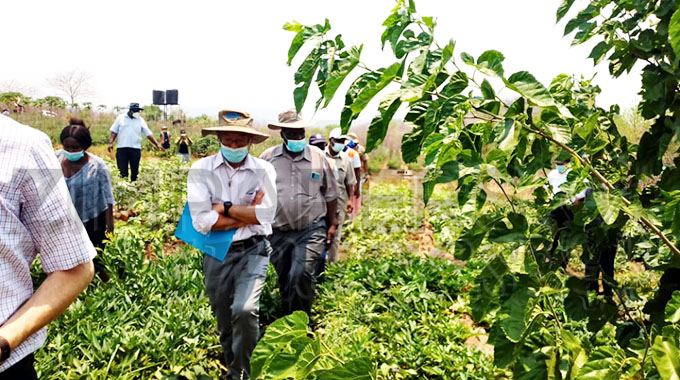Climate change adaptation reprieve for rural communities in Mt Darwin

Fungai Lupande Mashonaland Central Bureau
The scorching heat and severely malnourished cattle in Chipazi Village, Nyakutunguma ward 37 in Mt Darwin close to the border with Mozambique points to the devastating effects of climate change which increasingly threaten the livelihood of marginalised communities in low lying areas in Mashonaland Central.
The Japanese Government has availed US$5, 78 million to assist these areas to adapt to climate change and become more resilient through their programme Food Assistance for Assets (FFA) which saw the building of weir dams, nutrition gardens and solar-powered boreholes.
Nyakutunguma ward 37 and Kanyoka ward 11 are characterised by seasonal droughts and dry spells during the rainy season with people relying on water from hand-dug wells on the riverbanks.
Japan and the World Food Programme have developed over 2 000 community-based assets in 30 districts across the country.
Japanese ambassador to Zimbabwe Mr Satoshi Tanaka visited Nyakutunguma and Kanyoka projects on Thursday and commended the community for working tirelessly to create the food assistance assets.
The developments in these two wards have enticed people in Chimanimani who registered their interest to visit and learn.
“I am impressed that the communities are putting into practice activities to conserve the soil and water.
Climate change is serious and unfortunately here to stay evident by successive droughts in the past decade,” he said.
“It is essential for communities like yours to be more resilient. The new assets you have created including nutrition gardens, weir dams and improved fields will help to ensure you have nutritious and diverse meals, enough water to drink thought-out the year.
“On behalf of Japan, I want to thank the World Food Programme and World Vision for efficient interventions.”
He said since 2017, Japan cooperated with Zimbabwe in ensuring the human security of vulnerable people.
About 12 800 households across six districts have been reached through the, “enhancing food security, nutrition and resilience of communities affected by seasonal shocks and COVID19.”
WFP deputy country director Mrs Christine Abura Mendes said assistance from Japan has supported over 2 200 households approximately 11 000 people through WFP Food Assistance for Assets programme.
“These communities will have consistent and improved access to nutritious food for many years to come.
This means people are adopting better agricultural practices and understand the value of sharing resources,” she said.
“Participants in these programmes have been supported with skills-based training in areas such as environmental management, healthy harvest manual, fuel-efficient stoves and keyhole gardens as well as first aid and COVID19.
“These community assets are created with the goal of reducing the risk of disasters, strengthening livelihoods and increasing community resilience.”
Minister of State for Provincial Affairs and Devolution Senator Monica Mavhunga who was represented by the provincial development coordinator Mr Timothy Maregere expressed her gratitude to the Government of Japan.
“Kanyoka nutritional garden has been captured in our provincial economic development plan crafted in May this year as one of the projects addressing food, nutrition security and health well-being,” she said.
One of the beneficiaries Tambaoga Gwanzura said he was a hopeless drunkard who slept on an empty stomach with shoes on.
“The garden has transformed my life and now I spend all my time attending to the garden. I am able to pay school fees for my children, buy stationary. Domestic violence in my home is now a thing of the past,” he said.
The ambassador, Mrs Mendes and Mr Maregera lead the distribution of grain and cooking oil to the communities.








Comments